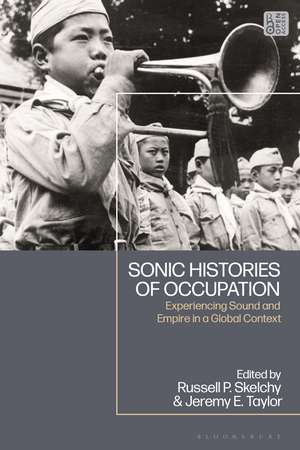Sonic Histories of Occupation: Experiencing Sound and Empire in a Global Context
Editat de Russell Skelchy, Jeremy E. Tayloren Limba Engleză Paperback – 26 iul 2023
| Toate formatele și edițiile | Preț | Express |
|---|---|---|
| Paperback (1) | 191.92 lei 6-8 săpt. | |
| Bloomsbury Publishing – 26 iul 2023 | 191.92 lei 6-8 săpt. | |
| Hardback (1) | 540.23 lei 6-8 săpt. | |
| Bloomsbury Publishing – 12 ian 2022 | 540.23 lei 6-8 săpt. |
Preț: 191.92 lei
Preț vechi: 249.67 lei
-23% Nou
Puncte Express: 288
Preț estimativ în valută:
36.73€ • 38.52$ • 30.57£
36.73€ • 38.52$ • 30.57£
Carte tipărită la comandă
Livrare economică 01-15 aprilie
Preluare comenzi: 021 569.72.76
Specificații
ISBN-13: 9781350228115
ISBN-10: 1350228117
Pagini: 256
Ilustrații: 20 bw illus
Dimensiuni: 156 x 234 x 25 mm
Greutate: 0.37 kg
Editura: Bloomsbury Publishing
Colecția Bloomsbury Academic
Locul publicării:London, United Kingdom
ISBN-10: 1350228117
Pagini: 256
Ilustrații: 20 bw illus
Dimensiuni: 156 x 234 x 25 mm
Greutate: 0.37 kg
Editura: Bloomsbury Publishing
Colecția Bloomsbury Academic
Locul publicării:London, United Kingdom
Caracteristici
Includes case studies from around the world including Canada, United States, Palestine, South America, Ireland, Philippines, Taiwan, China and Malaysia
Notă biografică
Russell P. Skelchy is an ERC Research fellow at University of Nottingham, UK, where he leads the "Sounds of Occupation" stream in the COTCA Project. His recent publications have appeared in the Ethnomusicology, Journal of Popular Music Studies, Action, and the volume, Vamping the Stage: Female Voices of Asian Modernities (2017). Jeremy E. Taylor is Associate Professor of Modern Asian History at University of Nottingham, UK, and Director of the COTCA Project. His research has been published in numerous journals including, most recently, the Journal of Asian Studies. He is the author of Rethinking Transnational Chinese Cinemas (2011) and Iconographies of Occupation: Visual Cultures in Wang Jingwei's China (2021).
Cuprins
List of FiguresList of ContributorsAcknowledgements'Introduction: Sonic Histories of Occupation' Russell P. Skelchy and Jeremy E. Taylor Part I: Voice and OccupationIntroduction: 'Voice and Occupation' Jeremy E. Taylor 1. 'The Vocal Apparatus's Colonial Contexts: France's Mission Civilisatrice and (Settler) Colonialism in Algeria and North America', Iris Blake 2. 'The Hush Arbour As Sanctuary: African American Survival Silence During British/American Slavery', Maya Cunningham 3.'Music and Sound in Weihsien Internment Camp in Japanese-occupied China', Sophia Geng Part IIIntroduction: 'Memory, Sound and Occupation', Jeremy E. Taylor 4. 'Occupying New Sound Worlds: Debordering Sonic Imaginaries in StoryMaps', Fiona Magowan and Jim Donaghey, with Annette McNelis 5. 'Loud Town, Quiet Base: Olongapo City, Subic Bay and the US Navy, 1950-70', Kevin Sliwoski 6. 'Registering Sonic Histories in a Multiply Occupied Place: Sound and Survivance in Mangota'ay, Taiwan', DJ Hatfield Part IIIIntroduction to Part Three: 'Auditory Responses to Occupation and Colonialism', Jeremy E. Taylor 7. 'The Sonic Occupation of Central Asia: Sound Culture and the Railway in Chingiz Aitmatov's The Day Lasts More Than a Hundred Years', Dimitri Smirnov 8. 'Auditory and Spatial Regimes of United States Colonial Rule in Baguio, Philippines', Russell P. Skelchy 9. 'Soundscapes of Diversity in the Port Cities of British Malaya: Cultural Convergences and Contestations in the Early Twentieth Century', Tan Sooi Beng Index
Recenzii
Sonic Histories of Occupation is the first collection of essays decolonizing sound studies on a global scale. From now on, histories of the trauma, dispossession and destruction wrought by colonial and imperialist rule that do not consider sound will be considered insufficient.
Sonic Histories of Occupation is important, useful, and above all, timely. It showcases the valuable work being done by scholars at the interdisciplinary nexus of musicology, ethnomusicology, sound studies, post-colonial studies, sub-altern studies, and history.
Sonic Histories of Occupation is important, useful, and above all, timely. It showcases the valuable work being done by scholars at the interdisciplinary nexus of musicology, ethnomusicology, sound studies, post-colonial studies, sub-altern studies, and history.
